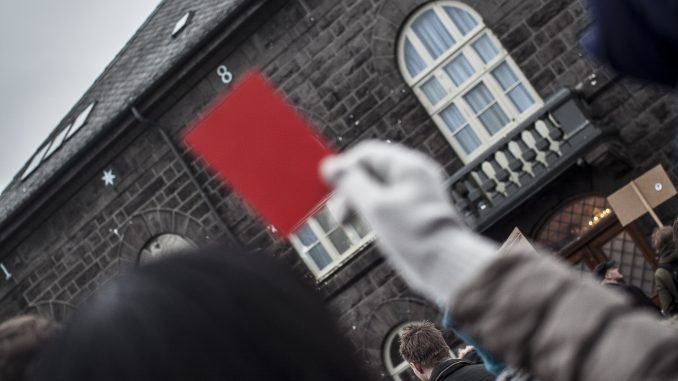
Protesters stay on streets after forcing PM's resignation
Protestors gather in front of the grey parliament building in central Reykjavik. They are still protesting having forced the resignation of the Prime Minister, Sigmundur David Gunnlaugsson, following revelations about his finances in the ‘Panama Papers’.
People have brought anything they can make a noise with – pots, fire alarms, whistles and drums. The noise gets louder the closer you get to the parliament buildings.
Òlöf Einarsdòttir and Begga Þontàr are standing on the left side of parliament. “We came here when we found out that he [the prime minister, Sigmundur David Gunnlaugsson] was going to remain in government. The rest of us are managing the best we can and then we hear about this – it's so unfair! People lost so much during the crisis; many we know were affected. We need a completely new government”.
“There are a lot of people here, all sorts,” Begga says. “Although there are fewer than on Monday,” Òlöf adds. “But I think people will continue to protest. At least the two of us will come here every day if needed,” Begga concludes.
“This is the parliament, not a house for criminals!” Pàll Heiðar Aadnegard says resolutely. He's been to different demonstrations in front of the parliament since 2007. He says that he has been working as a volunteer since the crisis, helping people who risk getting evicted. “We managed to prolong some evictions and even stop a few, but some we couldn't stop. I've seen some terrible things. This is not enough [protesting], but it's a step in the right direction.
“I'm prepared to keep going for as long as necessary! What we have to do is up to those inside there,” Pàll says and points towards the parliament building. “It's up to the morale of those people, and I'm guessing their morale is quite low!”
Ingunn Vilhjamsdòttir, Gunnar J. Karlsson and Fridrik Pòr Gestsson have all been part of organising the two main demonstrations. “There were 22, 000 at the demonstration on Monday and today (Wednesday) we counted nearly 6,600 participants,” Fridrik says.
Ingunn spoke at the first demonstration. “The main theme in my speech was: ‘This isn't OK. This is our country, our democracy. You've been fired!’. “We were all affected by the crisis. I know a lot of people that lost their jobs, homes, everything,” Gunnar says.
“My husband works in construction and after the financial crash every building site was at a standstill in Iceland. Now he has to work in Norway, away from the family. Many have been forced to do similar things, i.e. working for periods in other countries where there are available jobs or moving from Iceland completely. If you're born in a rich family with power, then you can't possibly understand what we feel, what we're going through.
“It's a problem that people with power are abusing the system and are hiding money overseas. We need new people in the government – ordinary people. It doesn’t work this way – capitalism doesn't work and people are beginning to realise that.”
Everyone I have spoken to, so far, participated in the wave of protest after the financial crisis in 2008 and again now in the record demonstration of the 4th April this year. They all agree on one thing: It's not enough that ministers just change their responsibility or resign. There needs to be a re-election. Many say there needs to be a change in the constitution.
More protests are planned for Thursday, Friday and Saturday. On leaving the demonstration I see the windows of parliament are covered with eggs and old bananas.
Special financial appeal to all readers of socialistworld.net |
Support building alternative socialist media Socialistworld.net provides a unique analysis and perspective of world events. Socialistworld.net also plays a crucial role in building the struggle for socialism across all continents. Capitalism has failed! Assist us to build the fight-back and prepare for the stormy period of class struggles ahead. Please make a donation to help us reach more readers and to widen our socialist campaigning work across the world. |
Donate via Paypal |
| M | T | W | T | F | S | S |
|---|---|---|---|---|---|---|
| 1 | 2 | 3 | ||||
| 4 | 5 | 6 | 7 | 8 | 9 | 10 |
| 11 | 12 | 13 | 14 | 15 | 16 | 17 |
| 18 | 19 | 20 | 21 | 22 | 23 | 24 |
| 25 | 26 | 27 | 28 | 29 | 30 | |


Be the first to comment